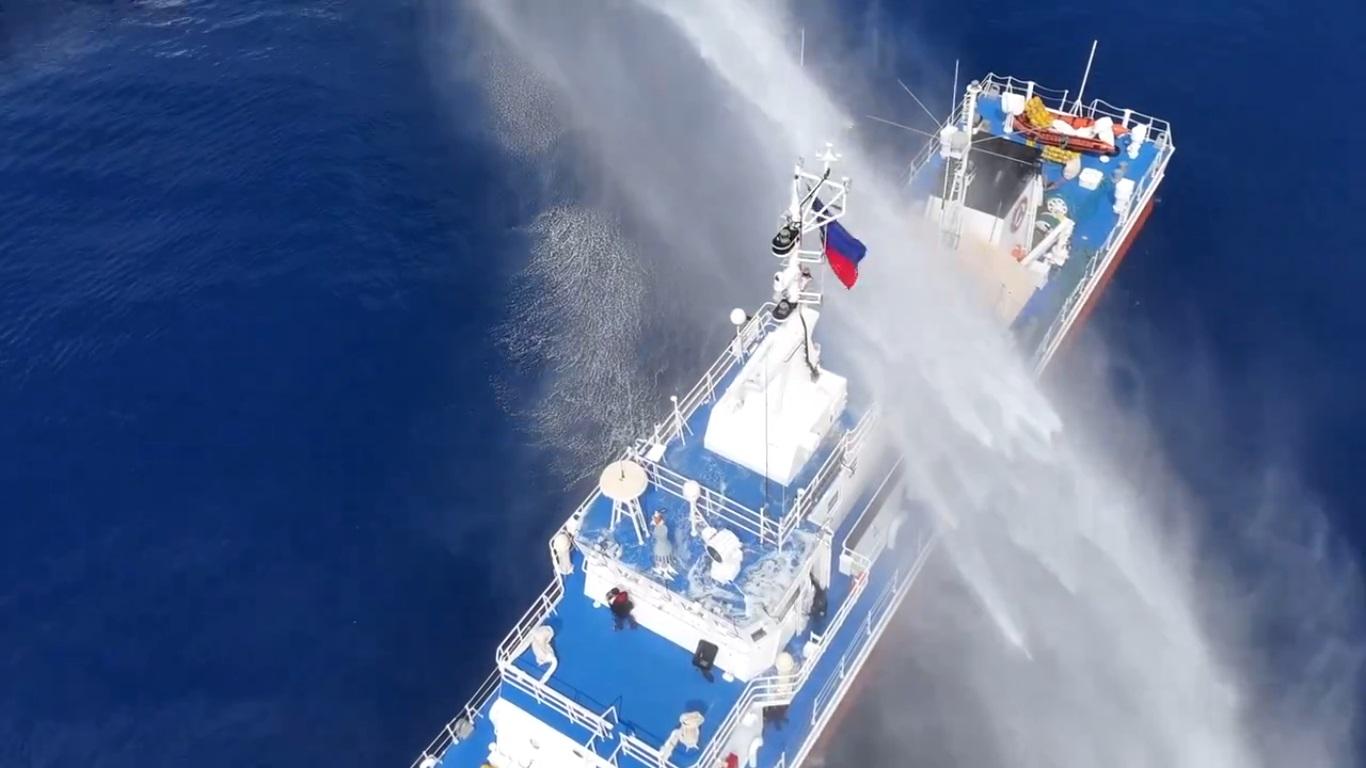PH mulls diplomatic protest over water cannon hitting flag

Manila is studying the possibility of filing a fresh diplomatic protest against Beijing after China Coast Guard (CCG) vessels unleashed water cannons on the Philippine flag hoisted by civilian vessels en route to Scarborough Shoal.
The Department of Foreign Affairs (DFA) on Friday said it was studying if the incident involving the Philippine flag—the symbol of the country's sovereignty—could serve as the basis for a new protest amid the heightening tensions in the West Philippine Sea, according to Jun Veneracion's report on 24 Oras.
"The protest signifies our position, tells them that we are not happy with what's happening in the waters, but the more important thing is, it is a legal document," said DFA spokesperson Teresita Daza.
The Philippines has already filed a total of 153 diplomatic protests against China under the Marcos administration regarding the territorial dispute, the 24 Oras report said.
Commodore Jay Tarriela, PCG spokesperson for the West Philippine Sea, said the impact of water cannon blasts this time carried an emotional toll.
"Sa ordinaryong tao na makikita na ang bandila natin, tinitira ng water cannon ito talaga napakasakit sa atin bilang Pilipino," Tarriela said.
(It is just painful for ordinary people, for us Filipinos to see our flag blasted by water cannons.)
"Doon sa question na flag ba talaga ang intentionally na target ng People's Republic of China? We can probably say that would be possible," Tarriela added.
In a statement on Thursday, the Chinese Embassy in Manila claimed that, in 2016, China had set a temporary special arrangement in the Scarborough Shoal, called Huangyan Dao by Beijing, with Philippine fishers and other agencies.
"According to the temporary special arrangements by the Chinese side in 2016, Filipino fishermen can fish with small fishing boats in designated waters except the lagoon of Huangyan Dao," the Chinese Embassy said.
"While the AFP, PCG, and other Philippine government vessels and aircraft should refrain from entering the 12 nautical miles and corresponding air space of Huangyan Dao," the embassy added.
'Fabricated stories'
However, the PCG on Friday denied that the Philippines had such a "temporary special arrangement" with China.
"Let us not be influenced by [China's] fabricated stories once again, which aims to confuse the Filipino people and divert the public discourse from the real issue of their harassment and provocative actions in Bajo De Masinloc," Tarriela said.
Further, Tarriela said that the Philippines does not recognize the 12-nautical-mile "red line" in the Scarborough Shoal, which China claimed was based on the "temporary special arrangement."
'Put an end'China had also claimed to have an arrangement for the Second Thomas Shoal or Ayungin Shoal as well as a "Gentleman's Agreement, Internal Understanding and New Model” with the Philippines.
Philippine officials have denied the supposed deals.
On the part of the DFA, Daza on Friday said, "I think we should put an end to this issue of special agreements."
"The key issue here is China, is actually, illegally in our EEZ (exclusive economic zone)," Daza said.
The increasing aggressiveness of China's water cannon attacks against Philippine vessels, the PCG earlier said, have shown that these could be "fatal."
President Ferdinand "Bongbong" Marcos Jr. had said that the 1951 Mutual Defense Treaty (MDT) between the Philippines and the United States (US) would be invoked if a Filipino serviceman is killed in the West Philippine Sea.
In providing his position, the President said that US Defense Secretary Lloyd Austin explained the matter "very well."
'Principally by the Philippines'
Meanwhile in Hawaii, Austin said America's Mutual Defense Treaty (MDT) with the Philippines was not subject to hypothetical scenarios.
Austin spoke during a joint press conference with his fellow defense chiefs Gilbert Teodoro of the Philippines, Minoru Kihara of Japan, and Richard Marles of Australia.
"You know, we've been very clear to everyone, to include Beijing, that the kind of behavior that we've seen where Filipino crews are put in danger, where, you know, troops—sailors have been injured and in property damage, that's irresponsible behavior, and it disregards international law," Austin said.
For his part, Teodoro said invoking the MDT would be principally decided by the Philippines.
"It is an agreement, and it will be a political decision, at the end of the day, principally by the Philippine government, when to invoke it. I would leave it at that," Teodoro said.
Teodoro added, "We are very conscious of the fact that we need to assert our rights, but in a manner that safeguards the safety of each and every member of the Philippine Armed Force, which is the principal actor in the area." — VDV, GMA Integrated News




